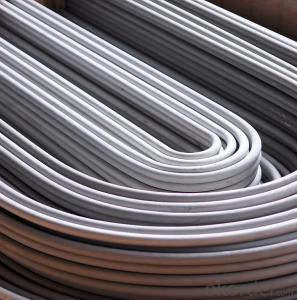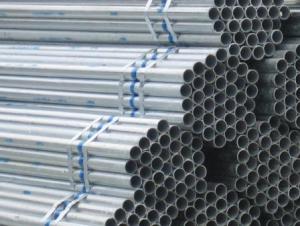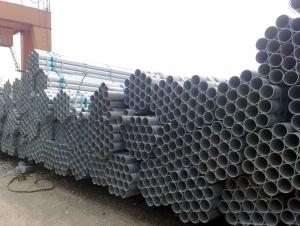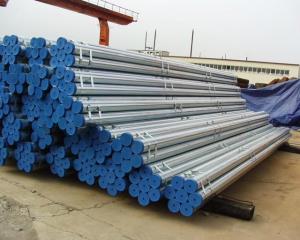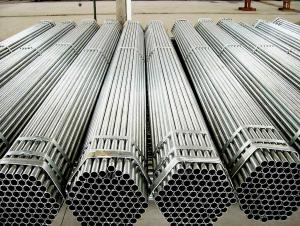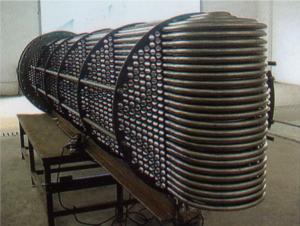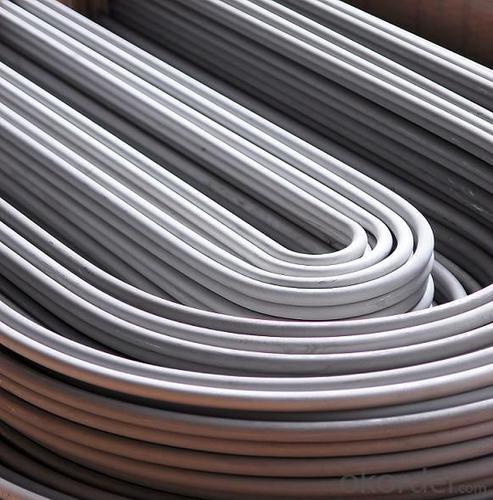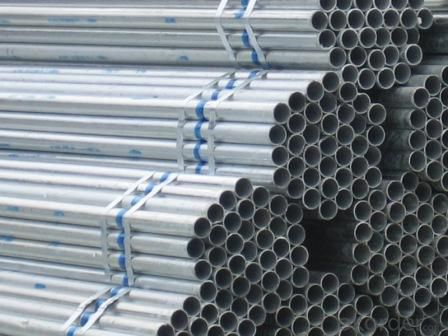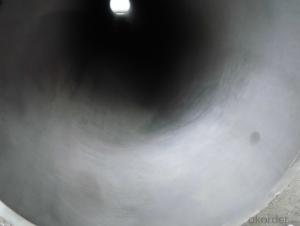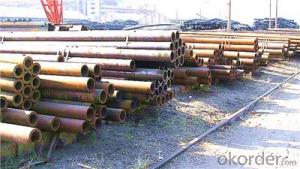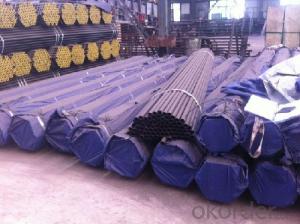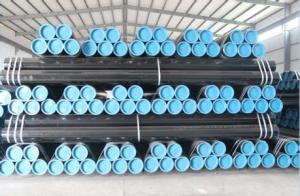U-shaped Seamless Steel Pipe Seamless Steel Pipe Steel Pipe
- Loading Port:
- China Main Port
- Payment Terms:
- TT or LC
- Min Order Qty:
- 25 pc
- Supply Capability:
- 6500 pc/month
OKorder Service Pledge
OKorder Financial Service
You Might Also Like
1、Structure of Welded Steel Pipe API SPEC 5CT:
Welded Steel Pipe is to be used for conveying gas, water, and petroleum foroil and natural gas industries. And used for structural steel pies purpose. As the manufacturing process does not include any welding, seamless pipes are perceived to be stronger and more reliable. Historically seamless pipe was regarded as withstanding pressure better than other types, and was often more easily available than welded pipe.
2、Main Features of Welded Steel Pipe API SPEC 5CT:
• High manufacturing accuracy
• High strength
• Small inertia resistance
• Strong heat dissipation ability
• Good visual effect
• Reasonable price
3、Welded Steel Pipe API SPEC 5CT: Specification:
Standard | GB, DIN, ASTM ASTM A106-2006, ASTM A53-2007 |
Grade | 10#-45#, 16Mn 10#, 20#, 45#, 16Mn |
Thickness | 8 - 33 mm |
Section Shape | Round |
Outer Diameter | 133 - 219 mm |
Place of Origin | Shandong, China (Mainland) |
Secondary Or Not | Non-secondary |
Application | Hydraulic Pipe |
Technique | Cold Drawn |
Certification | API |
Surface Treatment | factory state or painted black |
Special Pipe | API Pipe |
Alloy Or Not | Non-alloy |
Length | 5-12M |
Outer Diameter | 21.3-610mm |
Grade | 20#, 45#, Q345, API J55, API K55, API L80, API N80, API P110, A53B |
Standard | ASME, ASTM |
1) Material:20#(ASTM A 106/A53 GRB.API5LGRB,GB),45#,16Mn,10#.
2) Specification range:OD:21.3-610mm,WT:6-70mm,length:6-12m or according to the requirement of clients.
3) Excutive standards:GB,ASME API5L.ASTM A 106/A53,Despite of the above standards,we can also supply seamless steel pipe with standard of DIN,JIS,and so on,and also develop new products according to the requirements of our clients!
4) Surface:black lacquered,varnish coating or galvanized.
5) Ends:Beveled or square cut,plastic capped,painted.
6) Packing:bundles wrapped with strong steel strip,seaworthy packing.
4、Packaging & Delivery
Packaging Details: | seaworthy package,bundles wrapped with strong steel strip |
Delivery Detail: | 15-30days after received 30%TT |
5、FAQ of Welded Steel Pipe API SPEC 5CT:
①How is the quality of your products?
Our products are manufactured strictly according to national and internaional standard, and we take a test
on every pipe before delivered out. ②How about price?
Yes, we are factory and be able to give you lowest price below market one, and we have a policy that “ for saving time and absolutely honest business attitude, we quote as lowest as possible for any customer, and discount can be given according to quantity”,if you like bargain and factory price is not low enough as you think, just don’t waste your time.Please trust the quotation we would give you, it is professional one.
③Why should you chose us?
Chose happens because of quality, then price, We can give you both.Additionally, we can also offer professional products inquiry, products knowledge train(for agents), smooth goods delivery, exellent customer solution proposals.Our service formula: good quality+good price+good service=customer’s trust
SGS test is available, customer inspection before shipping is welcome, third party inspection is no problem.
6、 Welded Steel Pipe API SPEC 5CT: Images:
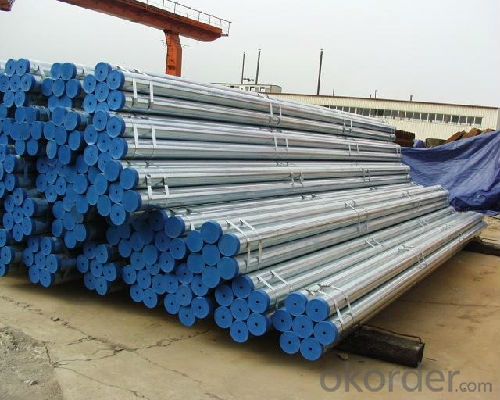
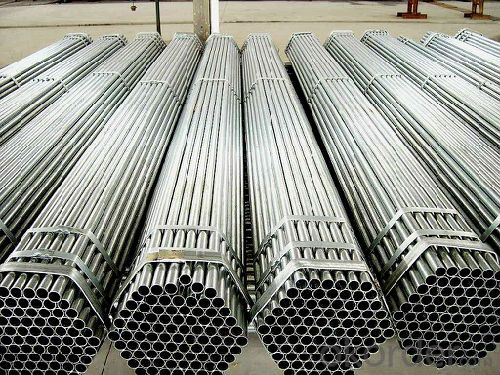
- Q: How are steel pipes used in the manufacturing of aerospace components?
- Steel pipes are commonly used in the manufacturing of aerospace components for various purposes such as fuel and hydraulic systems, structural supports, and exhaust systems. These pipes provide strength, durability, and resistance to high temperatures and pressure, making them suitable for critical applications in the aerospace industry.
- Q: How are steel pipes used in the construction of buildings?
- Steel pipes are commonly used in the construction of buildings for various purposes such as structural support, plumbing, and electrical installations. They provide strength and durability, allowing for the construction of high-rise buildings and large-scale structures. Steel pipes are used to create the framework of the building, forming the skeleton that supports the weight and load of the structure. Additionally, steel pipes are used for plumbing systems, effectively transporting water and sewage throughout the building. They are also used for electrical installations, providing a safe and efficient conduit for wiring. Overall, steel pipes play a crucial role in the construction of buildings, ensuring stability, functionality, and longevity.
- Q: Can steel pipes be used for the construction of transmission towers?
- Yes, steel pipes can be used for the construction of transmission towers. Steel pipes are known for their strength, durability, and ability to withstand heavy loads and harsh weather conditions, making them an ideal choice for building transmission towers. Steel pipes can provide the necessary support and stability required for high-voltage power transmission lines.
- Q: How are steel pipes used in the manufacturing of machinery and equipment?
- Steel pipes are widely used in the manufacturing of machinery and equipment due to their numerous beneficial properties. These pipes are primarily used for conveying various materials, fluids, and gases within the machinery, providing a safe and efficient means of transportation. One of the key uses of steel pipes in machinery manufacturing is in the process of hydraulic and pneumatic systems. Hydraulic systems rely on steel pipes to transmit power and control fluid flow, while pneumatic systems use these pipes to convey compressed air to power various components. The strength and durability of steel pipes ensure that they can withstand the high pressure and forces exerted by these systems, making them a reliable choice for such applications. Additionally, steel pipes are used in the construction of machinery frames and structures. Their high tensile strength and resistance to corrosion make them ideal for providing structural support and stability to heavy machinery. These pipes can be easily welded, bent, and fabricated into various shapes, allowing for flexibility in design and enabling the creation of complex machinery structures. Furthermore, steel pipes play a vital role in the transportation of raw materials and finished products within the manufacturing process. They are commonly used as conduits for the movement of liquids, gases, and granular materials, facilitating the smooth operation of machinery and equipment. Steel pipes are particularly suitable for handling abrasive and corrosive materials, as their robust construction ensures minimal wear and tear over time. In summary, steel pipes are extensively used in the manufacturing of machinery and equipment due to their strength, durability, and versatility. Whether it is for hydraulic systems, structural support, or material transportation, steel pipes are an integral component that contributes to the efficiency and reliability of machinery in various industries.
- Q: How are steel pipes used in the construction of tunnels?
- Steel pipes are commonly used in the construction of tunnels to provide structural support, facilitate drainage systems, and carry various utilities such as water, gas, or electrical cables. These pipes are often installed as part of the tunnel's foundation or as a protective casing for the tunnel's infrastructure.
- Q: What are the safety measures to consider when working with steel pipes?
- When working with steel pipes, there are several safety measures to consider. Firstly, it is essential to wear appropriate personal protective equipment (PPE) such as safety glasses, gloves, and steel-toed boots to protect against potential hazards. Additionally, workers should be cautious of sharp edges and take necessary precautions to avoid cuts or lacerations. Furthermore, it is crucial to implement proper lifting techniques and use appropriate lifting equipment when handling heavy steel pipes to prevent back injuries. Adequate training and supervision should be provided to ensure workers are aware of the correct procedures. Another safety measure is to secure the pipes properly to prevent them from rolling or falling, which can cause injuries or damage. Regular inspections of the pipes and the work area should be conducted to identify and rectify any potential hazards. Lastly, workers should be trained on fire safety measures and have access to fire extinguishers or other firefighting equipment in case of emergencies. Proper ventilation should also be ensured when working with steel pipes to avoid inhalation of hazardous gases or fumes. Overall, adhering to safety protocols, using appropriate equipment, and being aware of potential hazards are crucial safety measures when working with steel pipes.
- Q: What are the future trends in steel pipe manufacturing?
- Some of the future trends in steel pipe manufacturing include the use of advanced automation and robotics, the development of high-strength and lightweight steel materials, the implementation of sustainable and environmentally friendly manufacturing processes, and the integration of digital technologies for improved quality control and efficiency. Additionally, there is a growing focus on developing steel pipes with enhanced corrosion resistance and durability to meet the demands of various industries such as oil and gas, construction, and automotive.
- Q: How are steel pipes used in seaport infrastructure?
- Steel pipes are commonly used in seaport infrastructure for various purposes such as constructing piers, wharfs, and docks. They are used for the foundation of these structures, providing stability and strength. Steel pipes are also used in the construction of underwater pipelines for transporting oil, gas, and other fluids. Additionally, they are utilized in the fabrication of fences, barriers, and railings to ensure safety and security within the seaport area.
- Q: Can steel pipes be used for air conditioning systems?
- Yes, steel pipes can be used for air conditioning systems. Steel pipes are commonly used in air conditioning systems for their durability, strength, and resistance to corrosion. They can effectively transport refrigerant and withstand the high pressure and temperature conditions involved in air conditioning operations.
- Q: What is the difference between steel pipe and PVC conduit?
- Steel pipe is a rigid and durable material commonly used for plumbing and industrial applications. It is made of steel, which provides strength and resistance to high pressure and temperature. On the other hand, PVC conduit is a type of plastic piping that is flexible, lightweight, and non-conductive. It is primarily used for electrical installations, as it offers protection and insulation to the wires. The main difference between steel pipe and PVC conduit lies in their composition, rigidity, and purpose of use.
Send your message to us
U-shaped Seamless Steel Pipe Seamless Steel Pipe Steel Pipe
- Loading Port:
- China Main Port
- Payment Terms:
- TT or LC
- Min Order Qty:
- 25 pc
- Supply Capability:
- 6500 pc/month
OKorder Service Pledge
OKorder Financial Service
Similar products
Hot products
Hot Searches
Related keywords
